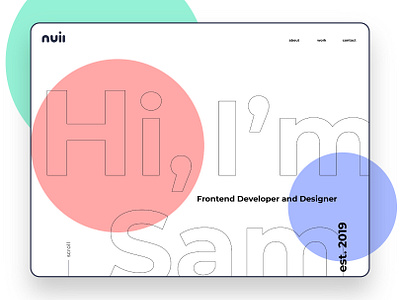In this sponsored blog post by our friends at Domain.ME, learn how to take control of your digital footprint and maximize your online presence so you get noticed.
You probably know by now that the design industry is a fast-moving, competitive field. In a world where a bit of online buzz can help make or break your career, owning your digital footprint is now more important than ever—whether you’re a freelance or full-time designer.
Nowadays, having a strong personal brand and successfully showcasing it online is crucial to finding new work opportunities, telling your brand story to potential employers, and let’s not forget—helping you stand out in a sea of design talent.
So, how do you curate and maximize your online presence to get noticed and make a strong first impression as a designer looking for new opportunities?
To help set your career up for success, we’re sharing three fundamental steps to building a strong personal brand online, and it all starts with investing in a personalized domain name. Here’s how to put your best foot forward, land more of the work you love, and show the world how awesome and professional you are:
1. Invest in a personalized domain name
We live in a digital age where the things we share online are never permanently deleted (trust us—we have the research to prove it). That’s why investing in a personalized domain name is critical to owning the search results that come up when someone Googles your name.
Remember, potential clients and employers will do their research. Having a personalized domain that links to your professional website will enable you to own the results that come up when anyone searches your name. Take control of your hiring destiny by pointing hiring managers to exactly what you want them to see. This way, you can be confident you’re always putting your best (virtual) foot forward.
Owning a personalized domain name also helps you build credibility and trust. It shows prospective clients and employers that you’re serious about your career because you’ve invested in building your professional brand.
Now that you’ve got your domain name locked down, it’s time to build and connect it to a personal website.
2. Build a personal website
While social media accounts are great for sharing work, it’s best practice to create a central hub where all of your information lives. Here’s why:
Hiring managers and clients look through piles of designer profiles—the last they want to do is scour the web trying to piece together who you are. In fact, hiring managers will likely eliminate you from consideration if the information they are looking for is not easy to find. Show them a good experience by making your professional profile readily available and accessible at the click of a button (your personalize domain name!).
The good news is, creating a website is easier than ever these days. There are plenty of simple CMS builders you can use like Squarespace, WIX, Webflow, and more. For an even quicker solution, you can also connect your domain to your existing Dribbble Playbook like designer superstar Julien Clauzier did here.
3. Tell your brand story
Now, it’s time to use your personal website to tell your brand story. This is your opportunity to communicate exactly what you want to prospective clients and employers, while giving them a full picture of who you are as a designer. Here are a few essential talking points you’ll want to include on your website:
- Your ‘About’ section: Who are you and what’s your unique perspective?
- What services do you offer? What do you specialize in?
- What kinds of clients or teams have you worked with in the past?
- Include feedback and recommendations from past clients.
- Include links to all your relevant social profiles (Dribbble, LinkedIn, etc.)
- Display your best work: Especially the kinds of projects you want to get hired for.
We can’t stress this enough: Telling your brand story is so crucial to making a strong, memorable first impression—so make sure you take the time to carefully craft and display this information on your website.
Some parting words
We want you to thrive in your design career, and the first step is taking control of your digital footprint. Remember, the true power of a personalized .ME domain is allowing you to show the world what you’re all about as a designer: who you are, what you do, and what you stand for. Follow the steps above and you’ll be well on your way maximizing your online presence as a professional designer. We can’t wait to share your accomplishments on our weekly Success Stories.
Until next time!

About the author: Natasa Djukanovic is the CMO of Domain.ME, the international tech company that operates the internet domain “.ME.” She has spent her entire career at the intersection of social media, leadership, and technology, and is constantly trying to figure out the secret to being in three different places at the same time.
Find more Process stories on our blog Courtside. Have a suggestion? Contact stories@dribbble.com.












